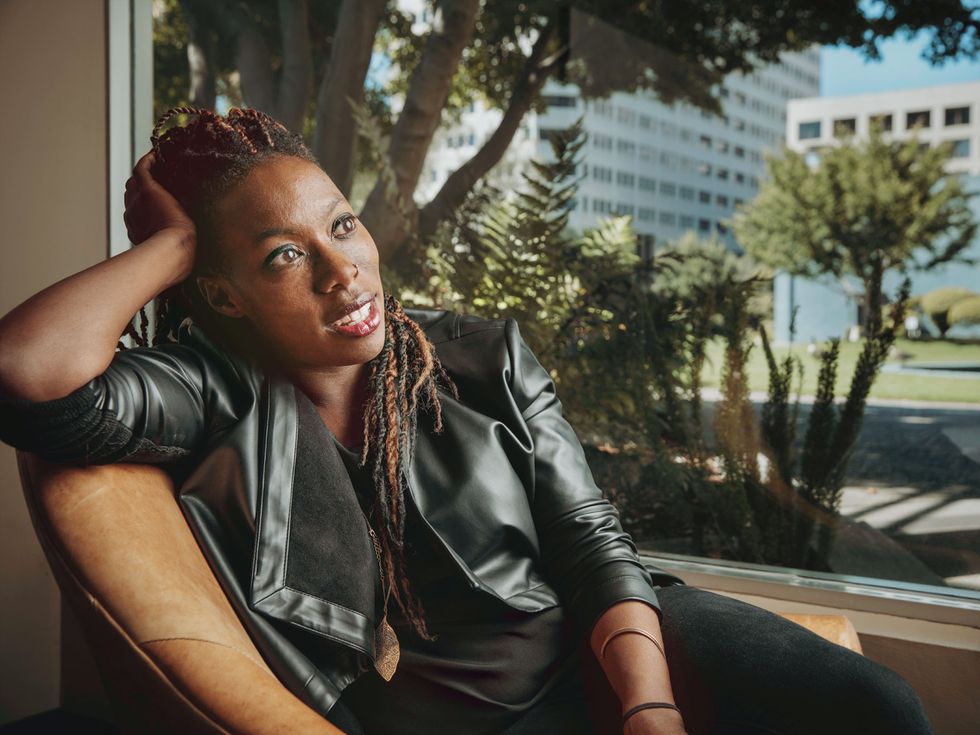Inside the beige, boxy office parks that dominate the landscape of Silicon Valley, programmers are busy inventing the next big thing and getting paid mightily to do so. Energy is high and the hours are long. The reigning principle is that with hard work, passion and a bit of seed money, anyone can become the next Mark Zuckerberg. And if you fail, it’s your own fault.
Yet Silicon Valley also is becoming notable as the latest breeding ground for men who behave badly toward women. The reality is that the vast majority of those cherished programmers are young white males, and the tech industry is starting to look like a rowdy frat house. In overwhelming numbers, women in the tech industry report discrimination, harassment, boorish behavior and hostile workplaces. A series of embarrassing public incidents and legal cases has brought serious questions about Silicon Valley’s behavior toward women.
What is it about the inner workings of tech companies that make some men think this is OK? Experts suggest several possible theories. Some point to the prevailing wisdom that the tech industry rewards merit above all else, and that anybody with the right kind of skills and determination can succeed — an outlook that can provide a convenient mask for misbehavior.
Other experts identify the “just like me” hiring practices that create clubby “bro cultures” and lead to a lack of appreciation of differences. Still others say the problem stems from unconscious cultural blindness that all humans possess to some degree. And some experts suggest that the problems are exacerbated by abuse of power by those who control investment capital. With all these forces at play, perhaps it should come as no surprise that Silicon Valley is finding itself in a diversity crisis.
The list of high-profile complaints involving discrimination against women by Silicon Valley companies has grown dramatically over the past couple of years, and particularly the past several months, as more women have been willing to come forward to tell their stories.
The catalytic moment in the discussion about discrimination in Silicon Valley came in 2015, most observers agree, when Ellen Pao went to trial in a discrimination suit against her employer, the influential venture capital firm Kleiner Perkins Caufield & Byers. The kind of behavior Pao and others described galvanized women in Silicon Valley. It didn’t matter that the jury didn’t buy it; many women in the tech industry felt a shudder of familiarity with Pao’s testimony.
Another wave of cases came over the past few months, after Susan Fowler, a software engineer at Uber, wrote a widely circulated post on Medium about being sexually harassed by her manager at the ride-sharing company. Worse, Fowler wrote that she complained to the company’s human resources department multiple times — but was rebuffed. The firestorm over her story resulted in internal investigations and, in June, helped lead to the resignation of Uber’s chief executive, Travis Kalanick.
Just a few days later, Binary Capital, a powerful venture capital firm, was forced to shut down a $175 million fund after at least six women accused managing partner Justin Caldbeck of making inappropriate advances, including groping one woman — in some cases as they were seeking funding from the company. Caldbeck resigned after it came to light that he also had been accused of harassing entrepreneurs at three venture firms before he cofounded Binary. Around the same time, several women described being harassed by other VCs, including Dave McClure of 500 Startups. He, too, stepped aside.
The problem is hardly limited to the executive suite: In August, Google fired an engineer who wrote a widely circulated screed questioning women’s competence to work in tech. “To suggest a group of our colleagues have traits that make them less biologically suited to that work is offensive and not OK,” Google CEO Sundar Pichai wrote in a company-wide memo.
These examples of sexism drew widespread media attention, but as more and more women came forward to tell their stories, it became clear that a discriminatory culture is embedded deeply within Silicon Valley’s office parks and Sand Hill Road’s venture capital firms.
The most dramatic research on women’s experience in the tech workplace was published last year in a survey known as “Elephant in the Valley,” which started as part of an independent study by Julie Oberweis and Monica Leas in Stanford University’s Graduate School of Business. They joined Trae Vassallo, a former coworker of Pao’s, former Yahoo executive Michele Madansky and other influential women in tech to survey more than 200 women across a wide age range, some of them in startups and some at the Valley’s top large tech firms. What they found seemed to come as a surprise to a lot of people — but perhaps not to many women.
Sixty percent of the women surveyed said they’d received unwanted sexual advances at work — nearly two thirds of them from a superior. Almost half the women surveyed said they’d been asked to do menial tasks while their male coworkers had not. In other words, it turns out that the problem isn’t limited to just a few bad apples in the Valley. Rather, there seems to be a pervasive culture of bias in Silicon Valley.
One big reason the Valley’s culture seems slow to embrace diversity — be it gender or racial — could be the stubborn attachment to the notion of meritocracy that the tech industry celebrates.
“The problem of diversity is harder to solve in tech because of the industry’s view of itself as being uniquely fair and meritocratic,” says Joelle Emerson, a women’s-rights lawyer who founded Paradigm Strategy Inc., a diversity consultancy that advises Silicon Valley companies including Pinterest and Airbnb. “And the more we continue to view this industry as a meritocracy, it makes it harder to drive progress.”
At Stanford’s Clayman Institute for Gender Research, one of the country’s first university labs to focus on workplace culture and harassment, Senior Director of Research Caroline Simard says the tech industry’s tendency to think of itself as meritocratic can provide a smokescreen for bad behavior. “The idea of a meritocracy creates an illusion of fairness,” Simard says. “And left to their own devices, humans are terrible at creating true meritocracies.”
Some observers of tech culture blame the “brilliant jerk” phenomenon. The tech industry’s obsession with the idea that some people are equipped with a certain off-the-charts innate ability can blind executives to a valued employee’s shortcomings. “Companies do whatever they can to keep people they’ve identified as supremely important,” Emerson says. “And sometimes those are the bad actors.” This means not just catering to eccentricities but also overlooking overtly bad behavior, she says, including harassment. That makes some men feel entitled and leads to bad behavior.
“Entitlement has come to define the culture of Silicon Valley,” says Freada Kapor Klein, who with her husband, software pioneer Mitch Kapor, heads the Kapor Center for Social Impact, a nonprofit across the San Francisco Bay from Silicon Valley in a refurbished building in downtown Oakland. “There is a profound arrogance that permeates it.”
This attitude of entitlement can discourage diversity and cause the clubbiness that has come to characterize some Silicon Valley companies. The tech industry employs a greater percentage of white males than U.S. private industry overall. Women hold 36 percent of jobs in the tech industry, compared to 48 percent in the rest of the business world, according to federal government data. African Americans hold only 7.4 percent of jobs in the tech sector, compared to 14.4 percent in private industry as a whole. (Asian Americans, however, are an exception: 14 percent of tech sector workers are Asian American, compared to 5.8 percent in U.S business overall.)
These homogeneous work environments seem to be endemic to the Valley’s startup culture. A couple of guys meet in college, where they studied coding in a department that was almost entirely male. One of these guys stumbles onto a new idea, they talk to a couple of guys they went to school with, and they decide to form a company. As the idea takes off, they add more guys who they know from school or social situations who look and think like them. And with that, another female-deficient corporate bro culture is born.
Some of the bias in Silicon Valley is little different from the unconscious bias that appears elsewhere in life. Robin Hauser, a documentary filmmaker, believes that most bias in companies is unconscious. Two years ago, Hauser released her film “Code: Debugging the Gender Gap,” a documentary that explores the reasons for the hiring gap among software engineers. The film clearly hit a nerve: The list of Silicon Valley companies that hosted a screening reads like a “Who’s Who” of tech companies.
Identifying and eradicating hidden bias, however, takes vigilance and constant attention — and some soul-searching. Emerson said she is continually astonished that clients seem surprised when she finds gender bias in their organization. “They say, ‘I can’t possibly be sexist. Not me. I’m an exception.’”
The problem of sexism in Silicon Valley is not limited to cubicle farms. As the Pao and Binary Capital cases illustrate, the culture of sexism reaches into boardrooms and the exclusive firms that finance technology companies.
In Silicon Valley, the power and influence of venture capital investors has never been greater — yet at the same time, there are relatively few female investors. In 1999, just 10 percent of investing partners at venture capital companies were women, according to research conducted by Babson College. By 2014, the number had declined to 6 percent. These overwhelmingly male VCs invest overwhelmingly in male-run ones: Female entrepreneurs received only $1.5 billion in funding last year, compared to $58.2 billion for men, according to PitchBook, which provides data on the venture capital industry. Just 16.8 percent of startups funded last year had at least one female founder. It can be difficult for female founders to call out male VCs’s for harassment when the investors have the power to fund a company and make it succeed or fail.
It’s also clear that Silicon Valley companies can have trouble understanding how to handle the complaints they get from female employees. The “Elephant in the Valley” survey found that 60 percent of the women who reported sexual harassment said they were dissatisfied with their company’s response, while 39 percent who were harassed said they did nothing because they felt it would negatively impact their career.
Y-Vonne Hutchinson, a labor rights lawyer turned diversity consultant whose company ReadySet works mostly with tech companies, says that when a company is seen as failing to act on a complaint, the culture can quickly turn toxic. “This creates an environment of impunity and a willingness to ignore certain behavior,” Hutchinson says. At a startup, bias and problem behavior can creep in before the company has had time to bring in professional human resources help, she says.
One role of consulting firms like Hutchinson’s is to help companies identify instances of bias in their procedures for hiring and promoting employees. Implicit bias can permeate nearly every aspect of decision-making, even finding its way into the algorithms many companies use to identify the best resumes. Tools to mitigate bias in hiring are helping, but the problem is so pervasive that nearly every company has a certain degree of built-in bias, experts say.
As complex as the problem seems, a look into the future shows what’s at stake if the industry does nothing.
Tech jobs are growing faster than colleges are producing computer science graduates. By 2020, there could be as many as 1 million unfilled software engineering jobs in the United States. There is no shortage of jobs for both sexes. But a familiar excuse for the lack of women in the industry is the so-called pipeline problem: The argument that there simply aren’t enough women with the right technical skills.
This is partly true. There are female computer scientists, of course, but not nearly enough of them, and that number is falling. The percentage of women studying computer science in college is less than half what it was 30 years ago, when women accounted for 37 percent of computer science students, according to figures from the U.S. Bureau of Labor Statistics. Engineering programs tell a similar story. Can it be we’ve actually gone backward? Or is the industry’s sexism driving women away?
Maria Klawe, the president of Harvey Mudd College, a small science and engineering-oriented college outside of Los Angeles where roughly half the computer science majors are women, recently said that she has long been reluctant to recommend that women computer science graduates seek out jobs in venture-capital-backed startups because of the bro culture. She warns women they might find themselves in a company with no human resources department to bring a complaint to. “If something goes wrong,” she told CNBC, “it’s a matter of luck whether you have management that cares about these issues.”
But blaming employers isn’t altogether fair. Studies show that educators — and parents — continue to steer boys to science and technology at a greater rate than they steer girls in that direction. By the time both get to college, far more teenage boys already know how to program than girls, which can make that first computer science class intimidating.
A similar phenomenon occurs once women get into technical jobs. A study by the Harvard Business Review in 2008 found that half of women in science, engineering and technology jobs leave the field in their mid to late 30s. The most common reason was hostile work culture, along with isolation and uncertainty about their potential to advance. The trend is costing the industry in both lost opportunities and unfilled jobs.
At the core, Silicon Valley’s female problem may built into its approach to tackling every challenge: Going its own way. After all, the tech industry didn’t transform the American economy and permanently alter consumer behavior by conducting business as usual. But it appears that it’s time to grow up. As we have seen this past year, women in Silicon Valley are increasingly calling out bad behavior, and companies are finding it in their best interests to listen.

Laurie J Flynn is writer and book editor who has written extensively for the New York Times and was an editor at the San Jose Mercury News.














